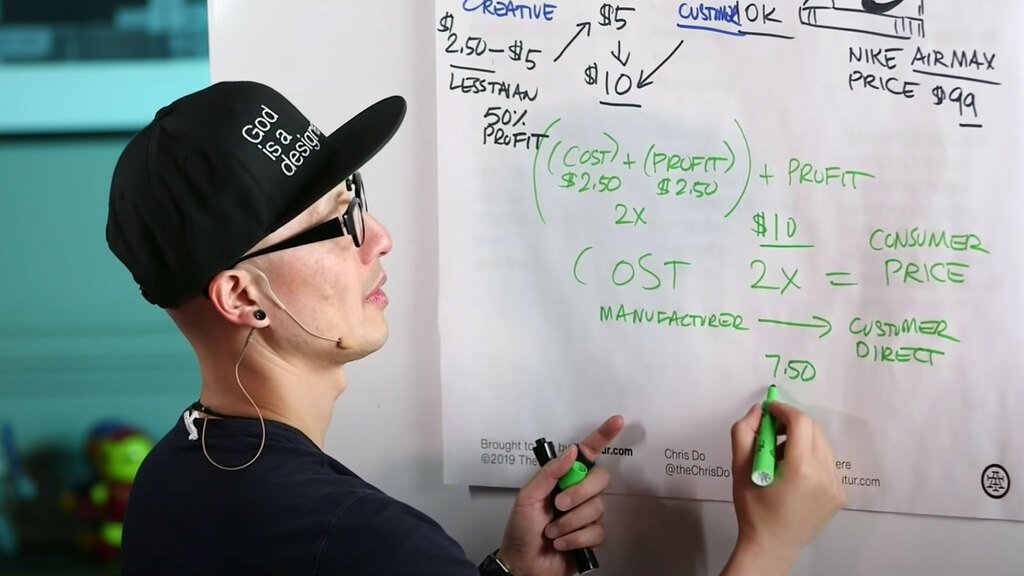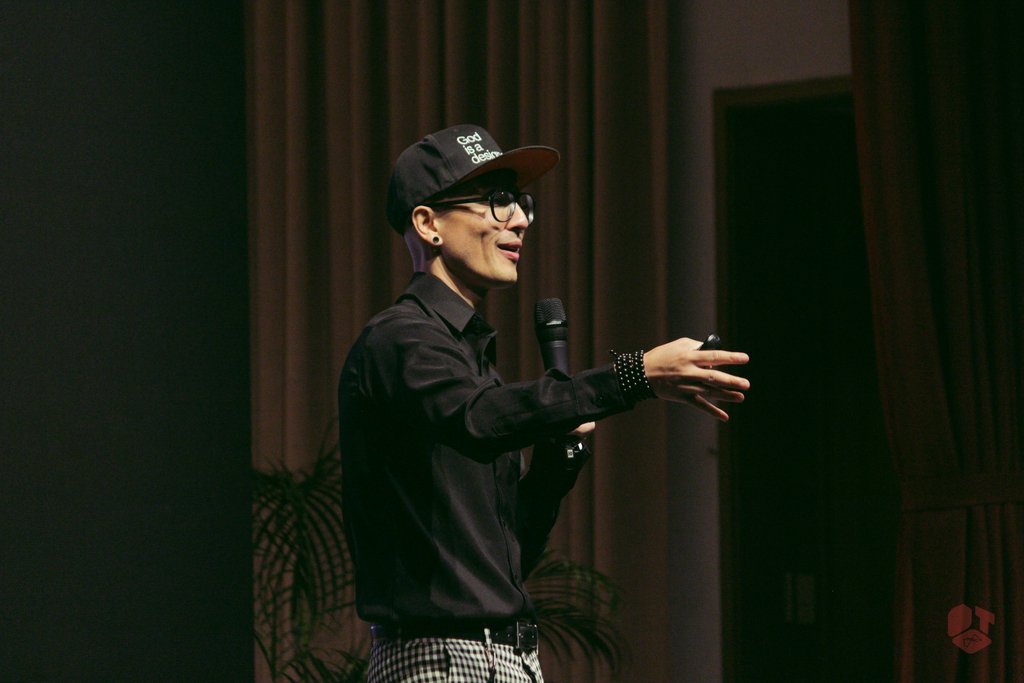Introduction and Interview Gabrielle de la Cruz
Images The Futur and Chris Do
“It’s important to be okay if it doesn’t work out at first, you can always use all the mistakes as lessons and just keep moving forward. I feel like we always remember the winners, but we don’t remember all the losers they went through to get to be the winners,” shares multi-hyphenate Chris Do. On the first day of the 2022 LIKHA Creative Summit, he talked to the audience about manifesting ideas into reality by reconciling with one’s principles, moving away from bad habits, and developing a better mindset. Personally, I was reminded of this: If you want something so bad, you have to go after it.
After his insightful and entertaining talk, there was an insatiable desire to learn more. The summit carried a rigid schedule and Do was rarely away from the crowd, so I grabbed the opportunity when he stepped outside for a break. I introduced myself and asked for a few minutes of his time for a quick interview. To my surprise, the ever-gracious Do said yes! It was hardly the most formal of introductions; the conversation felt more like a good-natured chat rather than a formal interview but even with the levity, there was a lot of substance to absorb and insights to glean. Our conversation follows:


Thank you for granting Kanto a few minutes of your time, Chris. May I ask what prompted you to want to speak in the Philippines? What creative potential do you see here?
Chris Do: One, I need to do a better job of bringing my message to a broader audience. I know that we have some dedicated and loyal fans here. My friend, Kia, asked me, “what’s it gonna take for you to come here?” and I simply replied, “let’s go.”
Because I’m originally from Saigon, Vietnam, I also feel like I have an obligation to help other people who may not have had the privilege of having the kind of education and growing up with the kind of culture that I’ve had. I just want to be able to share that.
Another thing, and I personally feel sad about this, is that the Philippines has a long history of colonialism. There are certain old-fashioned ideas that are holding you back. I want to be a part of changing that narrative. I hope to inspire a handful of people who can then inspire more people. To take part in that domino effect means a lot to me.
Are there any Filipino startups, companies, or individual talents that have caught your personal attention?
One would be Kenneth Cobonpue, he’s a world-famous designer. When I was in Cebu, I saw how he did chairs, lamps, and all kinds of things with wicker. Very interesting.
The other one is Albert Padin. He is the founder of Symph, a design, development, and startup studio. He came to our office once and taught me about user-experience design principles. So amazing!


What would you say are the key ingredients for a friendly creative or startup environment? Do you think there are certain legislations or conditions that would allow these ingredients to flourish?
Right now, we’re seeing that some of the most valuable companies in the world are those that develop digital ecosystems such as Facebook, Twitter, and more. We can see how much impact they’ve made in the world.
If governments recognize the huge economic drivers that these companies have and how much power that has, they could invest heavily to support and attract the brightest minds. This can lead to the development of intellectual property and that can have a massive economic impact that will ripple.
Is there one thing that you think more creative entrepreneurs should pay attention to that is not as much discussed?
Creative entrepreneurs need to learn how to run a business. I feel like they’re too focused on the creativity and the skill part that they are not focused enough on having that entrepreneurial mindset.
I believe that if they were, they would be a lot more successful. Pricing, marketing, sales, customer service, leadership, and communication are things they should be focusing on.


Do you believe that there are certain characteristics or qualities that a startup or a creative idea should possess before it is worth pursuing?
Primarily, you have to have a marketable idea. I believe that you should have an idea that is big, yet something can still be built. Oftentimes, people think of ideas that require too many partners to happen, so I suggest building a minimum viable product and just keep iterating.
It’s important to be okay if it doesn’t work out at first, you can always use all the mistakes as lessons and just keep moving forward. I feel like we always remember the winners, but we don’t remember all the losers they went through to get to be the winners.
This is something that a lot of people are probably curious about. What do you feel about employees leaving your practice to start their own thing, like what happened with Matthew Encina? Is this something you encourage?
Of course, I don’t want to actively encourage people to leave (laughs). But should they decide to leave, I will really be happy for them. I look at my role as part employer, part educator, and even as a father figure to some of these people.
I don’t think employment is forever; I think employment is for now. When it stops serving both the employer and employee, I believe that we have to respect that we outgrow each other and that it’s important for employees to leave the nest when they feel that it’s time.
For Matthew, it was a struggle for him to leave because there was an emotional connection. But it wasn’t news to me when he confronted me about it. I said, “Good for you, I’ve been waiting for you to have this conversation with me for a number of years.” I told him that I just didn’t want to push him out because when you encourage people to leave, sometimes it could sound like you’re trying to get rid of them.
Matthew had a vision and he had his way of doing things. I think he was being creatively stifled by trying to do it my way, so I was really happy for him. At first, he was concerned about not being able to maintain his finances, but when he left in the first year, he was able to earn four times more than what he was making before.
I just had lunch or dinner with him not that long ago. He also sends me lovely little text messages all the time such as, “Hey, you should check this out,” or “I heard about this thing.” Sometimes he would even offer to connect me with a certain company or person or even just reach out to ask me if I need help with something. I think that is a testament to our working relationship, that long after we have any stake in the things that either of us is doing, we still keep in touch with and try to help each other.
Since you mentioned your being an educator…People regard or see you as a mentor. Can you share with us the most recent lesson you’ve learned?
I say that I learn lessons every single day. This is going to sound weird, but sometimes I wish for things to not work out. Because when things don’t work out, I get a new story to tell. I also get knocked down a peg or two and I learn from those. I think we learn a lot more from our failures than from our successes. Sometimes I think, “This thing is going to fail,” but then it works. So I would go, “Okay, so it was supposed to work then.” (laughs)


I also think that you can learn from everybody. I learn a lot from my wife. She tells me stories that I am not exposed to and I usually respond with “Wow, I’m going to use that because I know other people are going to be impacted by this story.” I recall how she once told me a story about a Buddhist monk and a thief who broke into his temple while he was meditating. Do you know this story?
Honestly, no. I haven’t heard of it. Please tell us.
Okay. So while a Buddhist monk was focused on meditating, he suddenly heard that a thief broke into his temple. The monk said: “If you’re looking for money, it’s over in the other room and you can get it there. Will you just make sure you leave some for me so I can pay the rent?
The thief responded “okay,” went into the room, got some money, and left some for the monk. On his way out, the monk asks, “Are you forgetting something?” “What do you mean?” replied the thief. The monk goes, “Usually, when you get a gift, you should say thank you. And what I gave you is a gift.” The thief then said thank you and left.
Shortly after, the police caught up with the thief, arrested him, found the money, and went out to return it to the monk. Of course, they needed the monk to identify the thief to charge him. When they came to the monk’s temple, they asked, “Is this the person who stole your money?”
To their surprise, the monk replied, “No, he didn’t steal my money. I gave it to him.” The thief was astonished that the monk said that, but he has already done enough crimes so he still had to go to jail.
Years later, when the thief came out of the cell, he converted to Buddhism, looked for the monk, and became the monk’s disciple.
This is such a wonderful story. There is a lot that you can pull away and learn from it.
Wow, I wish life was that easy.
Life doesn’t have to be harder than that. If you want good things for people, you do it. There are no excuses.
Thank you so much, Chris. It’s a pleasure to meet you. •
Kanto.com.ph is a proud media partner of the Likha Creative Entrepreneurship Summit. Watch out for our exclusive interview with Kia Abrera. Soon here at Kanto.
Gabrielle de la Cruz started writing about architecture and design in 2019. She previously wrote for BluPrint magazine and was trained under the leadership of then editor-in-chief Judith Torres and previous creative director Patrick Kasingsing. Read more of her work here and follow her on Instagram @gabbie.delacruz.


2 Responses